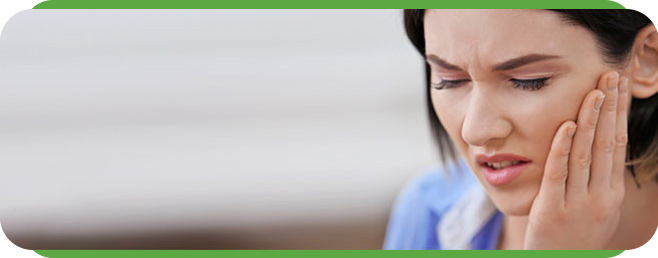Snap, Crackle, Pop Goes the Jaw


It’s been around forever. You can even finish the sentence. Snap, crackle, pop… Rice Krispies. Unfortunately, it’s more than Rice Krispies that goes snap, crackle, pop. It could also be your jaw. We often hear patients say that as they are chewing and talking, there’s been times they simply had to stop because their jaw is making so much noise. It’s more than just a laughing matter- it could be a symptom of a condition known as temporomandibular joint disorder (TMJD).
There are several ailments that can affect a person’s jaw. For instance, there are cases where the jaw can be misaligned. Dental work can also alter the normal bite. The name is quite self-explanatory. A misalignment of the jaw is when a person’s upper and lower teeth are out of alignment which can also cause the muscles and joints to be out of balance.
Symptoms
The signs of a misaligned jaw can vary and can also be intricate in many cases. The most common indicators of misalignment are headaches, ringing in the ear and discomfort. An individual may feel tenderness or pain in the jaw or in proximity to the ears. This is because the lower jaw or mandible is connected to the temporal bone, which is found in front of the ears.
It’s more than just the snap, crackle, pop. TMJ disorders can also cause ear pain, ringing in the ears, itching ears and dizziness. Sleep loss due to pain arousals can also be experienced, leading to symptoms of sleep deprivation. TMD can limit jaw opening and cause generalized oral facial pain.
Furthermore, a misaligned jaw may induce continuous facial pain and patients may experience issues each time they try to open their mouth. Other symptoms include difficulty in chewing, jaw clenching, popping sensation in the joint or a feeling similar to locking of the jaw.
Solutions
Koala® Center For Sleep & TMJ Disorders offers a solution that doesn’t include medications or surgery. Following a consultation and exam, our doctors will take impressions of the upper and lower teeth and custom fabricate an oral appliance for the lower jaw, fitting much like a sportsguard. With the appliance in place on the lower jaw, the bite is at rest, the joints are in balance and healing begins. Often patients experience immediate relief. On average our patients experience a 50% improvement of headaches and jaw pain within the first week of treatment with the lower jaw dental orthotic and 90% symptom free within three months.
If you or a member of your family are looking for an option that doesn’t include medications or surgery, come to a Koala® Center For Sleep & TMJ Disorders and see if an oral appliance may be right for you. Discover options you can live with. You can also visit us at KoalaSleepCenter.com.

Additional Services You May Need
▸ KoalaKIDZzz®
▸ Sleep Apnea
▸ Snoring
▸ TMJ Disorder
▸ Fatigue
▸ Sleep Disorders
▸ Weight Loss
▸ CPAP Alternative
▸ Oral Appliances




